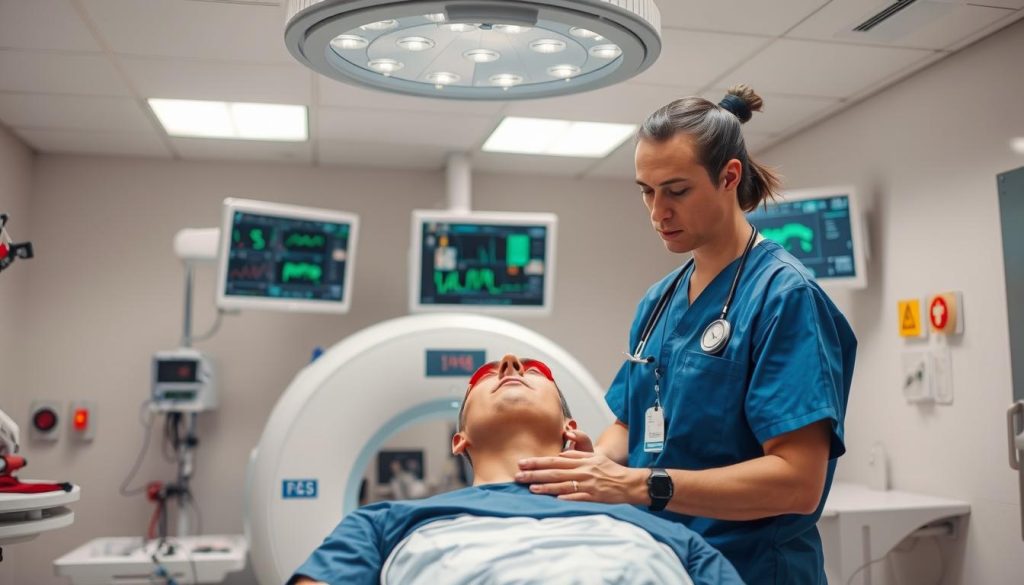Is Surgery Needed For A Concussion? Concussions are complex brain injuries that need careful treatment. Many wonder, “Is surgery needed for a concussion?” This guide aims to answer that and give a full view of concussion treatment options.
Most of the time, surgery isn’t needed for concussions. They usually heal with rest and the right care. This guide will look at concussion management, from diagnosis to recovery strategies.
We’ll look at concussion severity levels, causes, and immediate medical responses. It will also cover non-surgical treatments, rehabilitation, and when surgery might be needed.
By the end, readers will understand concussion treatment and when to get medical help. This info is useful for athletes, parents, or anyone concerned about concussion care.
Understanding Concussions and Their Severity Levels
Concussions are a type of brain injury that can range from mild to severe. It’s important to know the signs of head trauma for proper treatment and recovery. Let’s look at the different levels of concussions and what they mean.
Mild Concussion Characteristics
Mild concussions are the most common. Symptoms include brief confusion, headache, and dizziness. These usually go away in a few days to weeks with rest and care.
Moderate Concussion Indicators
Moderate concussions have more intense symptoms. Patients might have long-lasting headaches, memory problems, and balance issues. Recovery can take several weeks to months.
Severe Concussion Signs
Severe concussions are the most serious. They can cause loss of consciousness, seizures, and cognitive impairments. These cases need immediate medical attention and can take longer to recover.
| Severity Level | Key Symptoms | Recovery Time |
|---|---|---|
| Mild | Brief confusion, headache | Days to weeks |
| Moderate | Memory issues, balance problems | Weeks to months |
| Severe | Loss of consciousness, seizures | Months to years |
Knowing these levels helps identify concussion symptoms and get the right care. Always see a doctor for any head trauma to get the right diagnosis and treatment.
Is Surgery Needed For A Concussion: Medical Perspectives
Most doctors say surgery isn’t needed for a concussion. Instead, they recommend rest and watching for any changes. The brain can heal itself with the right care and time.
But, in rare cases, surgery might be talked about. This is when a concussion leads to serious problems. These problems are not common and usually happen with more severe injuries.
- There’s significant bleeding in the brain
- Severe swelling occurs
- A skull fracture is present
These issues are not just from a concussion. They show more serious injuries that might happen with a concussion.
“Most concussions heal with rest and careful management. Surgery is reserved for severe cases with complications beyond the concussion itself.”
Doctors look at many things before deciding on surgery. They check the patient’s symptoms, test results, and overall health. Each case is different.
| Concussion Severity | Typical Treatment | Surgical Consideration |
|---|---|---|
| Mild | Rest and monitoring | Rarely needed |
| Moderate | Extended rest, symptom management | Unlikely |
| Severe | Intensive care, close monitoring | Possible if complications arise |
Every concussion is different. Always get advice from a doctor for the best treatment and care.
Common Causes and Mechanisms of Concussion Injuries
Concussions are a type of brain injury that can happen in many ways. Knowing what causes them helps us prevent and treat head injuries better.
Sports-Related Concussions
Contact sports like football, hockey, and soccer are high-risk for concussions. Players often get hit in the head during games. This can make the brain move too fast inside the skull, causing injury.
Vehicle Accident Impact
Car crashes are a big reason for concussions. When a car stops suddenly or turns sharply, the head can hit the steering wheel, dashboard, or window. Even with seatbelts, the impact can hurt the brain.
Fall-Related Head Trauma
Falls are another common cause of concussions, mainly in kids and older adults. Slipping on ice, falling from ladders, or accidents during daily activities can lead to head injuries.
| Cause | Risk Factors | Prevention Measures |
|---|---|---|
| Sports | Contact sports, lack of protective gear | Proper equipment, technique training |
| Vehicle Accidents | Speeding, distracted driving | Seatbelts, airbags, defensive driving |
| Falls | Uneven surfaces, poor balance | Home safety modifications, strength exercises |
It’s important to know the common causes of concussions to prevent them. By understanding how brain injuries happen, we can lower the risk of head trauma in our daily lives.
Immediate Medical Response and Emergency Care
If you think someone has a concussion, act fast. The first thing to do is to take them away from the activity. This stops them from getting hurt more and lets doctors check them out.

- Loses consciousness for more than 30 seconds
- Has repeated vomiting
- Experiences seizures
- Shows signs of confusion or disorientation
- Has unequal pupil size
For on-site treatment, keep the person calm and quiet. Don’t take off their helmet unless you know how. Putting ice on the hurt area can also help.
At the hospital, doctors will do a detailed check-up. They might check reflexes, memory, balance, and more. They might also use CT scans to look for serious injuries.
The main goal is to keep the patient safe and prevent bad outcomes. Early and right care is key for a good recovery.
Diagnostic Procedures for Concussion Assessment
Getting a concussion diagnosed right is key to healing. Doctors use different ways to check for brain injuries and how bad they are. Let’s look at the main steps in concussion diagnosis.
Neurological Examinations
Doctors do neurological exams to see how the brain is working. They check balance, coordination, and reflexes. They also look at memory, focus, and other brain functions that concussions can affect.
Imaging Tests and Scans
Imaging tests are sometimes used to find serious brain injuries. Common ones are:
- CT (Computed Tomography) scans
- MRI (Magnetic Resonance Imaging)
- fMRI (Functional MRI)
These scans show detailed brain images. They help doctors spot bleeding, swelling, or other damage.
Cognitive Function Testing
Cognitive tests check mental skills that concussions can mess with. These might include:
| Test Type | Function Assessed |
|---|---|
| Memory tests | Short-term and long-term recall |
| Attention tests | Focus and concentration |
| Processing speed tests | Information processing abilities |
| Executive function tests | Problem-solving and decision-making skills |
By using these tests together, doctors can accurately diagnose concussions. They then make treatment plans that fit each patient’s needs.
Non-Surgical Treatment Options and Management
Most concussions get better without surgery. Non-surgical care focuses on rest and careful management. Doctors suggest a mix of physical and mental rest to help the brain heal.
Rest is essential in concussion treatment. Patients should stay away from screens, loud noises, and bright lights. As symptoms lessen, they can slowly return to normal activities. This can take days to weeks, depending on the severity.
Medications help manage symptoms. Over-the-counter pain relievers can ease headaches. Doctors might prescribe stronger pain meds or anti-nausea drugs in some cases.
- Physical therapy to improve balance and coordination
- Cognitive therapy to address memory and thinking issues
- Occupational therapy to help with daily tasks
These therapies are part of a complete concussion treatment plan. They aim to speed up recovery and prevent long-term issues. Regular check-ups with a healthcare provider ensure proper healing.
“The goal of non-surgical concussion care is to give the brain time to heal while managing symptoms effectively.”
If symptoms last, doctors might suggest more treatments. These could include vestibular therapy for dizziness or vision therapy for visual issues. The goal is a treatment plan that fits each patient’s needs.
When Surgical Intervention Becomes Necessary
Most concussions heal on their own, but severe cases might need surgery. Doctors check each case to see if surgery is needed. Let’s look at when surgery is necessary.
Intracranial Pressure Cases
Some concussions cause too much pressure inside the skull. This is called intracranial hypertension and can be deadly. Surgeons may need to relieve this pressure to save the brain.
Brain Bleeding Complications
Severe concussions can cause brain bleeds. These bleeds can press on brain tissue and stop it from working right. Surgery aims to stop the bleeding and remove clots to protect the brain.
Skull Fracture Scenarios
Skull fractures with a concussion might need surgery. This is true for depressed fractures where bone fragments press on the brain. Surgeons fix the fracture and ease pressure on the brain.
| Condition | Surgical Approach | Recovery Time |
|---|---|---|
| Intracranial Pressure | Decompressive Craniectomy | 3-6 months |
| Brain Bleeding | Hematoma Evacuation | 1-3 months |
| Skull Fracture | Cranial Repair | 2-4 months |
Remember, surgery for concussions is rare. Most people get better with rest and non-surgical treatments. Always talk to doctors for the right care for brain injuries.
Recovery Timeline and Rehabilitation Process
How long it takes to recover from a concussion varies a lot. It can take days to months, based on how bad the injury is. A mild concussion might heal in 7-10 days. But, a moderate concussion could take 2-4 weeks. And, severe cases might need months of careful care.
The rehab process is done step by step. First, rest is very important. When symptoms get better, you can start doing more things. This part is about finding the right balance between rest and doing light activities.
Concussion recovery includes special therapies:
- Physical therapy to help with balance and coordination
- Cognitive rehabilitation to boost memory and focus
- Occupational therapy to help get back to work or school
Healthcare providers keep an eye on how you’re doing and change treatment plans as needed. They might use tests to see how well you’re getting better. It’s important to be patient and not rush back too soon.
Getting better from a concussion means following doctor’s orders, resting enough, and slowly getting back to normal. With the right care and time, most people can get back to their life before the injury.
Post-Concussion Syndrome: Long-Term Effects
Post-concussion syndrome can last for weeks, months, or even years. It’s important to understand these long-term impacts for proper recovery.
Cognitive Symptoms
Cognitive issues are common in post-concussion syndrome. People often have memory problems, trouble concentrating, and slower thinking. These symptoms can make daily life, work, and school hard.
Physical Manifestations
Physical symptoms often last in post-concussion syndrome. Many experience headaches, dizziness, and sensitivity to light and noise. Balance problems and fatigue can also occur, making daily routines tough.
Emotional Impact
The emotional toll of post-concussion syndrome is significant. Mood swings, irritability, and anxiety are common. Some may develop depression or experience personality changes. These emotional challenges can harm relationships and quality of life.
| Symptom Category | Common Manifestations | Potential Impact |
|---|---|---|
| Cognitive | Memory issues, poor concentration | Work/school difficulties |
| Physical | Headaches, dizziness, fatigue | Limited daily activities |
| Emotional | Mood swings, anxiety, depression | Strained relationships |
It’s key to recognize these long-term effects for effective treatment. A team approach that covers cognitive, physical, and emotional symptoms is often best.
Prevention Strategies and Protective Measures
It’s important to prevent concussions and head trauma for our health. Using smart protective measures can lower injury risks. Let’s look at ways to manage concussions and prevent head trauma.
Using the right equipment is critical in sports to prevent concussions. Helmets, mouthguards, and other gear must fit right and be safe. Checking equipment often helps keep us protected.
Education is also key in preventing injuries. Athletes, coaches, and parents must know about concussion risks and signs. Training helps teach how to avoid head impacts.
- Wear the right protective gear for sports and activities
- Learn and practice safe techniques in contact sports
- Create safe environments at home, work, and play areas
- Implement return-to-play protocols after head injuries
Workplace safety is vital to prevent head trauma. This includes wearing hard hats in construction and preventing falls. Regular safety checks help find and fix hazards.
| Setting | Prevention Strategy | Impact on Concussion Risk |
|---|---|---|
| Sports | Proper equipment and technique | Reduces risk by up to 50% |
| Workplace | Safety protocols and gear | Decreases incidents by 40% |
| Home | Fall-proofing and childproofing | Lowers accidents by 30% |
By using these strategies, we can make safer places. This helps lower concussion and head trauma risks. Remember, it’s always better to prevent than treat when it comes to brain health.
Return-to-Activity Guidelines and Protocols
Managing a concussion means carefully returning to daily life. This ensures a safe recovery and avoids setbacks. Let’s look at the important steps to take after a head injury.
Physical Activity Progression
Starting with light exercise is key for recovery. Begin with walking and gradually increase the intensity. Always stop if symptoms get worse.
Work and School Reintegration
Going back to work or school needs a step-by-step plan. Start with short mental tasks at home. Then, increase the time and task complexity. Talk to employers or teachers about any needed help.
Sports Participation Timeline
Athletes must follow a strict return-to-play protocol. This includes a 5-step process:
| Step | Activity | Duration |
|---|---|---|
| 1 | Light aerobic exercise | 5-10 minutes |
| 2 | Sport-specific training | 20-30 minutes |
| 3 | Non-contact drills | 45-60 minutes |
| 4 | Full contact practice | Normal training |
| 5 | Return to competition | Game play |
Each step should last at least 24 hours. If symptoms return, go back to the previous step. Always check with a healthcare professional during this time.
Is Surgery Needed For A Concussion?: Latest Research and Treatment Advances
Concussion treatment has made big strides in recent years. Scientists are finding new ways to spot and treat brain injuries. One breakthrough is using blood tests to find concussions. These tests look for proteins that show up in the blood after a head hit.
Virtual reality is becoming a key tool in treating concussions. It lets patients practice balance and thinking skills in a safe space. This helps doctors see how well patients are doing and change treatment plans as needed.
Stem cell therapy is also being looked at for serious brain injuries. Early studies suggest it might fix damaged brain areas and help patients recover better. Though it’s not ready yet, this could change how we treat concussions in the future.
Doctors are also working on making treatment plans just for each patient. They use genetic markers and brain scans to create personalized plans. This could help patients get better faster and have better results in the long run.
“The future of concussion treatment lies in precision medicine. We’re moving towards therapies that target each patient’s unique biology and injury pattern.”
New rules for managing concussions are being made. These rules stress the need for quick action and careful steps back to normal activities. They also remind us to keep watching for symptoms, even after someone seems to have gotten better.
Is Surgery Needed For A Concussion?: Support Systems and Resources for Recovery
Recovering from a concussion often needs a strong support network. Local support groups are great for sharing experiences and tips. They offer emotional support and practical advice for daily challenges.
Educational resources are also key in managing concussions. Websites like the Centers for Disease Control and Prevention offer free, reliable info. They help patients and families understand concussion symptoms and recovery.
Professional services are vital for complete concussion care. Neurologists, physical therapists, and mental health experts create recovery plans. They guide patients through healing, adjusting treatments as needed.
Community programs and school services also help with concussion management. They offer modified learning plans for students or work accommodations for adults. With the right support, individuals can better handle concussion recovery.
Is Surgery Needed For A Concussion?: FAQ
Q: Is surgery typically needed for a concussion?
A: No, most concussions don’t need surgery. They can be treated with rest, medicine, and therapy. But, if there’s severe bleeding or pressure in the brain, surgery might be needed.
Q: What are the different severity levels of concussions?
A: Concussions are divided into three levels: mild, moderate, and severe. Mild ones might cause brief confusion and headaches. Moderate ones can lead to longer symptoms and memory loss. Severe ones can cause loss of consciousness and lasting brain problems.
Q: How are concussions diagnosed?
A: Doctors use several ways to diagnose concussions. They do neurological exams, imaging tests, and cognitive tests. They check symptoms, do physical exams, and use tools to test balance and mental status.
Q: What are the most common causes of concussions?
A: Concussions often happen in sports, car accidents, and falls. Sports like football and hockey increase the risk. Car crashes and falls, mainly in the elderly and young, also cause concussions.
Q: What immediate steps should be taken after a suspected concussion?
A: If you think you have a concussion, stop all activity and see a doctor. Remove the person from danger. Rest is key, and watch for worsening symptoms. Seek emergency care for severe symptoms like vomiting or loss of consciousness.
Q: How long does it typically take to recover from a concussion?
A: Recovery time varies. Mild concussions might take 7-10 days. Severe ones can take weeks or months. Always follow your doctor’s advice and slowly get back to normal.
Q: What is post-concussion syndrome?
A: Post-concussion syndrome is when symptoms last long after the injury. It can include memory issues, headaches, and mood changes. It’s a complex condition.
Q: Are there any long-term effects of concussions?
A: Some people may have lasting effects from concussions, like headaches or memory problems. This is more common after multiple concussions. Proper care can help manage these effects.
Q: How can concussions be prevented?
A: Preventing concussions involves wearing protective gear, following safety rules, and learning about concussion awareness. Proper techniques in sports and a safe environment also help.
Q: When is it safe to return to sports after a concussion?
A: Returning to sports after a concussion should be gradual and under a doctor’s watch. Start with rest, then light exercise, and gradually increase activity. Each step should be symptom-free before moving on.


















